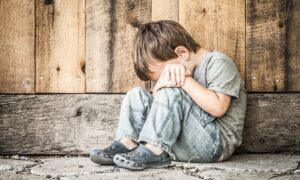The two child limit: a cruel and unfair false economy

Image credit: alreporter.com
Every child born in the UK, whatever their circumstances, is a member of our society. Society has a choice - we can do our best to support and nurture those children, to help them grow into healthy, happy adults, or we can turn our backs on them, allow them to struggle and then condemn them if their adult lives do not meet with our approval.
This month marks the seventh anniversary of the two child limit on benefits. This, in effect, says to small children who are living in poverty and have two or more siblings: "Sorry, we won't help you because we think your parents made a bad decision, so we're going to punish you for it."
The two child limit, implemented in 2017, means that low-income families who claim benefits and have a third child born after April 2017, miss out on around £3,200 a year in social security support for that child, and any subsequent children.
The two-child limit was sold as a 'fair' policy, a political embodiment of the 'Don't have kids if you can't afford to keep them.' philosophy. Yet a moment's thought reveals this to be highly prejudiced and very unfair. Prejudiced because like most of the Conservatives' welfare 'reforms', enthusiastically promoted by Iain Duncan Smith, it divides the population into 'hardworking taxpayers' who do not claim benefits, and therefore deserve respect, and people who do claim benefits, and therefore have failed in some way and do not deserve to be respected.
This simplistic view is, of course, far removed from the complex and messy circumstances of real life. Many parents will be working very hard in low-paid jobs, and need to claim Universal Credit. Some will have had three or more children when they were financially secure, then disaster struck. A job loss, accident, illness or bereavement can reduce a family's income drastically, but they then find in their hour of need that as far as the state is concerned, their third child is an unaffordable luxury who deserves no support.
Even if, for the sake of argument we were to accept that, somehow, parents having a third child had been irresponsible - why would any decent society want to punish the children for that? And obviously, it's not just the third child which is affected by this policy. When a family is tipped into poverty, no parent will mimic the Conservatives and treat the third child differently. All the children will suffer, when there's not enough food in the house and the electricity meter runs out.
What makes the two child limit such a terribly bad policy is that not only is it morally wrong to consign children to poverty because they have more than one sibling - it is also undoubtedly a false economy. Whether we support children in poverty through the benefits system or not, there will be a cost somewhere along the line. Children growing up in poverty may have poorer health and struggle at school, they may even become vulnerable to criminal exploitation. This all leads to higher demands on numerous public services: the NHS, children's services, social care, the police, and in the worst case scenarios, prison. Why would we spend money on all this misery, when we can invest in health and happiness instead?
The crucial role of the two child limit in producing child poverty was revealed when the New Economics Foundation analysed the most recent poverty data. It found that, "local authorities that experienced the biggest increase in child poverty were the places where more families are impacted by the two-child limit.".
Because of its design, the numbers affected by this policy are growing inexorably over time. In 2018, 70,000 families were affected - by 2023, it was 420,000. When the policy is fully rolled-out and affects all families with three or more children, it will have an impact on around 750,000 families. This means we have a 'social security ' system which has rising child poverty designed into it, a hole in the safety net which will continue to grow. The only way to deal with this deplorable situation is to scrap the two child limit.
Unusually for such a significant policy, we actually have within the UK an example of how things can be done differently, and we are beginning to see the outcome. The Scottish Child Payment, introduced in 2021, is now available for every child under 16 in Scotland, so has helped to mitigate the effects of the two child limit. Amidst the cost of living crisis, while child poverty has risen in the rest of the UK, it has remained stable in Scotland. Indeed, Child Poverty Action Group says that with the full roll out of the Scottish child payment and increases to its value, child poverty should soon be falling in Scotland.
Politicians in Westminster have it in their power to reduce or to increase child poverty. There is really no excuse for choosing the latter.
© Bernadette Meaden has written about political, religious and social issues for some years, and is strongly influenced by Christian Socialism, liberation theology and the Catholic Worker movement. She is an Ekklesia associate and regular contributor. Her latest book is Illness, Disability and Caring: A Bible study for individuals and groups (DLT, 2020). Her latest articles can be found here. Past columns (up to 2020) are archived here. You can follow Bernadette on Twitter: @BernaMeaden


















